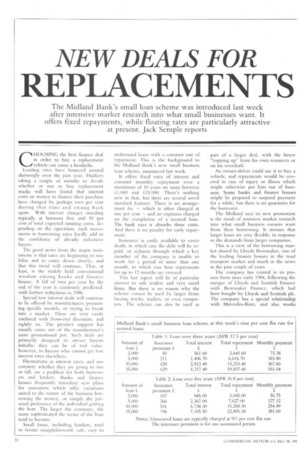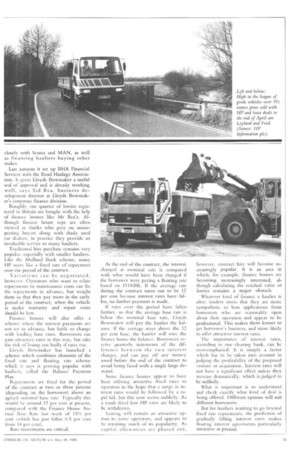NEW DEALS FOR
Page 54

Page 55

If you've noticed an error in this article please click here to report it so we can fix it.
REPLACEMENTS
The Midland Bank's small loan scheme was introduced last week after intensive market research into what small businesses want. It offers fixed repayments, while floating rates are particularly attractive at present. Jack Semple reports
CHOOSING the best finance deal in order to buy a replacement vehicle can cause a headache. Lending rates have bounced around alarmingly over the past year. Hauliers taking a couple of months to decide whether or not to buy replacement trucks will have found that interest costs on money to finance their purchase have changed by perhaps two per cent during that time and swung back again. With interest charges standing typically at between five and 10 per cent of total expected running costs, depending on the operation, such movements in borrowing rates hardly add to the confidence of already indecisive buyers.
The good news from the major institutions is that rates are beginning to stabilise and to conic down slowly, and that this trend will continue. That, at least, is the widely held conventional wisdom among banks and finance houses. A fall of two per cent by the end of the year is cautiously predicted, with further reductions in 1986.
Special low interest deals will continue to be offered by manufacturers promoting specific models, or trying to break into a market. These are very easily confused with front-end discounts, and rightly so. The product support has usually come out of the manufacturer's same promotional pot. Such deals are primarily designed to attract buyers initially; they can be of real value, however, to buyers who cannot get low interest rates elsewhere.
Fluctuations in interest rates, and uncertainty whether they are going to rise or fall, are a problem for both borrowers and. lenders. Banks and finance houses frequently introduce new plans for customers which offer variations suited to the nature of the business borrowing the money, or simply the personal preference of the individual getting the loan. The larger the company, the more sophisticated the terms of the loan tend to become.
Small firms, including hauliers, tend to favour straightforward, safe, easy to understand loans with a constant rate of repayment. This is the background to the Midland Bank's new small business loan scheme, announced last week.
It offers fixed rates of interest and constant monthly repayment over a maximum of 10 years on sums between £1,000 and £15,000. There's nothing new in that, but there are several novel standard features. There is no arrangement fee — which is often charged at one per cent — and no expenses charged on the completion of a secured loan. The bank says it absorbs these costs. And there is no penalty for early repayment.
Insurance is easily available to cover death, in which case the debt will be repaid, or sickness through which a key member of the company is unable to work for a period of more than one month, in which case loan repayments for up to 12 months are covered.
This last aspect will be of particular interest to sole traders and very small firms. But there is no reason why the scheme cannot be used by larger firms buying trucks, trailers, or even computers. 'The scheme can also be used as part of a larger deal, with the buyer "topping up" from his own resources or on his overdraft.
An owner-driver could use it to buy a vehicle, and repayments would be covered in case of injury or illness which might otherwise put him out of business. Some banks and finance houses might be prepared to suspend payment for a while, but there is no guarantee for the borrower.
The Midland says its new promotion is the result of intensive market research into what small business owners want from their borrowing. It stresses that larger loans are very flexible, in response to the demands from larger companies.
This is a view of the borrowing market shared by Lloyds Bowinaker, one of the leading finance houses in the road transport market and much in the •news in the past couple of years.
The company has existed in its present form since early 1984, following the merger of Lloyds and Scottish Finance with Bowmaker Finance, which had been bought by Lloyds and Scottish plc. The company has a special relationship with Mercedes-Benz, and also works closely with Scania and MAN, as well as financing hauliers buying other makes.
Last autumn it set up RHA Financial Services with the Road Haulage Association. It gives Lloyds Bowmaker a useful seal of approval and is already working well, says Sid Rea, business development director at Lloyds Bowmaker's corporate finance division.
Roughly one quarter of lorries registered in Britain arc bought with the help of finance houses like Mr Rea's. Although finance house reps are often viewed as sharks who prey on unsuspecting buyers along with shady used car dealers, in practice they provide an invaluable service to many hauliers.
Traditional hire purchase remains very popular, especially with smaller hauliers. Like the Midland Bank scheme, many HP users like a fixed rate of repayment over the period of the contract.
Variations can be negotiated, however. Operators who want to relate repayments to maintenance costs can fix the repayments in advance, but weight them so that they pay more in the early period of the contract, when the vehicle is under warranty and repair costs should be low.
Finance houses will also offer a scheme where the interest payments are not set in advance, but liable to change with lending base rates. Borrowers can gain attractive rates in this way, but take the risk of losing out badly if rates rise.
Lloyds Bowmaker has launched a scheme which combines elements of the fixed rate and floating rate scheme which it says is proving popular with hauliers, called the Balance Payment Plan.
Repayments are fixed for the period of the contract at two or three percent (depending on the borrower) above an agreed nominal base rate. Typically this would be around 12 per cent at present, compared with the Finance House Annual Base Rate last week of 131/2 per cent (which has just fallen 0.5 per cent from 14 per cent).
Rate movements are critical. At the end of the contract, the interest charged at nominal rate is compared with what would have been charged if the borrower were paying a floating rate based on Fl IABR, If the average rate during the contract turns out to be 12 per cent because interest rates have fallen, no further payment is made.
If rates over the period have fallen further, so that the average base rate is below the nominal base rate, Lloyds Bow-maker will pay the haulier the balance. If the average stays above the 12 per cent base, the haulier will owe the fin:m(7e house the balance. Borrowers receive quarterly statements of the difference between the two interest charges, and can pay off any money owed before the end of the contract to avoid being faced with a single large demand.
Some finance houses appear to have been offering attractive fixed rates to operators in the hope that a surge in interest rates would be followed by a rapid fall, but this now seems unlikely. As a result fixed low HP rates are likely to be withdrawn.
Leasing will remain an attractive option to some operators, and appears to be retaining much of its popularity. As capital allowances are phased out, however, contract hire will become increasingly popular. It is an area in which, for example, finance houses are becoming increasingly interested, although calculating the residual value or lorries remains a major obstacle Whatever kind of finance a haulier is after, lenders stress that they are more sympathetic to loan applications from borrowers who are reasonably open about their operation and appear to be professional. This makes them keener to get borrower's business, and more likely to offer attractive interest rates.
'Ibe importance of interest rates, according to one clearing bank, can be over-emphasied. It is simply a factor which has to be taken into account in judging the profitability of the proposed venture or acquisition. Interest rates will not have a significant effect unless they increase dramatically, which is judged to be unlikely.
What is important is to understand and check exactly what kind of deal is being offered. Different options will suit different borrowers.
But for hauliers wanting to go beyond fixed rate repayments, the prediction of gradually falling interest rates makes floating interest agreements particularly attractive at present.




















































































